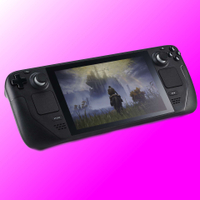Introducing the Beth Deck, a 3D-printed gaming handheld that can be 'assembled in 15 minutes' using the guts of a Framework laptop
It's an impressive build that v2 may make better.


The gaming handheld market is a rich tapestry of different designs, with some interesting gimmicks, but most of the internals in the best handheld gaming PCs are pretty similar by this point. If you want something totally unique and even quite upgradeable, one creative designer has made a project to wrap around Framework's modular laptop to build your own.
As spotted by Notebookcheck, Beth Le, a user on Printables—a 3D printing blueprint and projects websites—has designed what they call the Beth Deck. With the Beth Deck project, you can take any 13-inch mainboard from Framework, and cram it into a gaming handheld shell to create your own device.
Notably, any of the 13-inch Framework mainboards can work with it, so you can spend exactly as much as you would like to get this device up and running. We're fans of what Framework does here at PC Gamer so it's nice to see an unconventional build really taking advantage of what sets the company apart. With Framework's modular parts, you can build a laptop, essentially from scratch, which means they are easy to repair and upgrade.
As pointed out by Beth, "the whole thing can be assembled in about 15 minutes and disassembled in less than 2 minutes with no soldering and all non-printed parts can be purchased"
On the project page, there are ten 3D print schematics, that, when paired with the following, are all you need to make the handheld yourself:
- 6x M3x25mm button head screws
- 5x M3x5mm button head screws
- 6x M3x4mm heat set insert
- 1x M2.5x4mm Standoff
- 1x Easy SMX M05 Gaming controller
- 1x USB-C dongle with 2xUSB-A,
- 1x USB-C and HDMI
- 1x Waveshare 8-inch 800p touchscreen
- 1x 50mm 90-degree USB-C extension
- 2x 100mm 90-degree USB-C to USB-A adapter
- 1x 200mm HDMI Ribbon cable (A1-A1)
- 1x USB-C 90-degree adapter
- Framework 13-inch mainboard
- Framework 13-inch battery
This is quite a lot of gear (totaling around $150 without the Framework parts or the 3D printing filament) but building something like this could make room for it to be upgraded in the future. It can theoretically work with any 13-inch Framework board so, as long as Framework continues to support 13-inch builds—which it has through four generations of Intel chips, one AMD, and even a RISC-V board—you should be able to swap it out for something more powerful down the line.
As well as this, Framework mainboards go on sale once a new generation comes out, so you can always hold out for a nice reduction before making the commitment.
The biggest gaming news, reviews and hardware deals
Keep up to date with the most important stories and the best deals, as picked by the PC Gamer team.
I'd recommend holding off on building this if you are looking for a gaming handheld replacement. Firstly, Framework boards are designed for laptops which means they don't have the bespoke design of handhelds. You will likely be sacrificing that balance of power, heat, and battery life that handhelds have. They also don't have fan controls, unlike some other laptop manufacturers.
The 7840U board needed to mimic the power seen in many gaming handhelds will cost you $699 at retail price, which is more than the cost of other devices, before mentioning all the extra parts you need.
As well as this, the Beth Deck has some issues that Beth is planning on fixing with revision 2. Created as part of a Framework mainboard case competition, this is one hell of an entry from Beth, and a pretty good way to use a framework board if you have one lying around. It feels like a great project to start if you're a bit of a hardware geek, and it looks pretty solid too, even if it won't beat out the ROG Ally X anytime soon.
Best handheld gaming PC: What's the best travel buddy?
Steam Deck OLED review: Our verdict on Valve's handheld.
Best Steam Deck accessories: Get decked out.
James is a more recent PC gaming convert, often admiring graphics cards, cases, and motherboards from afar. It was not until 2019, after just finishing a degree in law and media, that they decided to throw out the last few years of education, build their PC, and start writing about gaming instead. In that time, he has covered the latest doodads, contraptions, and gismos, and loved every second of it. Hey, it’s better than writing case briefs.
Most Popular








